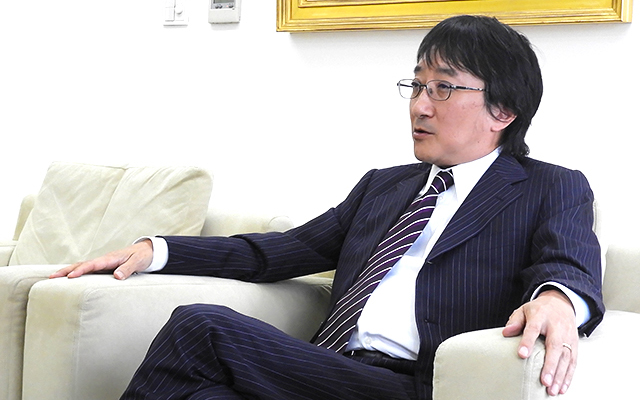
With permission from © Horipro International, Inc. | Photo © grape Japan
Interview With Horipro International CEO Yoshitaka Hori (Part 3): The Business of Musicals
- Tags:
- CEO / Cool Japan / Death Note The Musical / Horipro / Horipro International / Interview / Japan Expo / May'n / selling abroad / Success / Yoshitaka Hori
Related Article
-
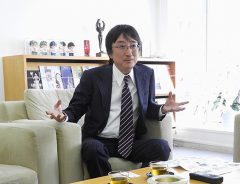
Interview With Horipro International CEO Yoshitaka Hori (Part 1): Founding Motives
-

An Interview With Akarin and Kanipan Of Maid Pop Unit @17
-

Alice Hirose exclusive interview Winter 2021 from “Familiar Wife”
-
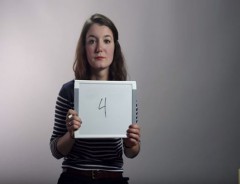
Redefining Success. These People Rate Their Success, And Then Compare With Loved Ones—How Did It Turn Out?
-
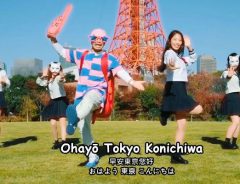
The Most Ridiculous Song For Learning Japanese English
-
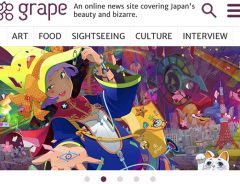
grape Japan Site Update Featuring Original Illustration By Hiroyuki-Mitsume Takahashi


Introduction
In June 2018, Japanese entertainment giant HoriPro Inc. announced the creation of HoriPro International, a new company wholly owned by HoriPro, with the goal of aggressively expanding overseas with a focus on Asia. Aiming for the “creation of world-class specialists,” HoriPro International manages voice actors and music artists with international potential. May’n, Azusa Tadokoro, Ami Wajima, Machico, DJ YURIA, and cosplayer Liyuu are some of the more famous members in the current lineup.
At the helm of HoriPro International is visionary leader Yoshitaka Hori, President & CEO of HoriPro Inc. A vital contributor to the HoriPro Group ever since he joined in 1993, Mr. Hori has been president since 2002 and chairman since 2008.
We had the good fortune of interviewing Mr. Hori at length in his Meguro office to gain insights into the background and establishment of Horipro International, his vision for Japanese musical and voice talents as well as stage productions on an international scale and the way his own experiences abroad have influenced his thinking.
Continued from Part 2
The profitability of musicals in Japan and abroad
grape Japan (gJ): You have achieved numerous successes producing musicals abroad, not only with Death Note the Musical, which you mentioned earlier, but also Billy Eliot, NINAGAWA McBeth and Mary Poppins. And most recently, a musical based on Akira Kurosawa’s film Ikiru. From such experiences, could you tell us what you see as the appeal of musical shows and their potential?
Yoshitaka Hori (YH): One thing is the money. Musicals like The Lion King, which I mentioned earlier, and The Phantom of the Opera have now been running for 30 years. We’re talking about a global revenue of 500 to 600 billion JPY (4.4 to 5.3 billion USD). All over the world, including Japan, they’re doing local productions—I’ve been to the Andrew Lloyd Webber [theaters] in London—and the cash keeps flowing in. That profit becomes seed money to make an even bigger show the next time.
With permission from © Horipro International, Inc. | Photo © grape Japan
As for Japanese productions, no matter how hard you try, you can do it for one month at most. For any given concert hall, there are going to be other companies who want to rent it out, and the longest you can reserve it is one month, that’s just the rule here. It doesn’t matter what the show is, that’s how long you have. No matter how big a hit it turns out to be, you have to wrap it up in a month. That means your budget for the set is limited. There’s no way you can reach the international level.
To put it in terms of musical artists, as soon as you step one foot outside of Japan to compete against the likes of Madonna and Paul McCartney, you can say you’re "Number One" in Japan, but you’re nothing more than a local star.
It’s the same thing for stage shows. Foreign producers have been coming to Japan more frequently to see our shows in recent years, but we tell them it’s not 'what you see is what you get.' “If you use this script and use the minimum budget, this is what we can do.” It’s embarrassing to admit, but that’s the kind of presentation we make for them.
So, when it’s a hit, you make incredible profits.
Then, the other issue is there’s no more material to use. Whether it’s the West End or Broadway—and I suppose you could say the same for Hollywood—people have already used it up. It's the same thing that's happening with Japanese TV dramas. Now they're recycling old movies. Apparently Pretty Woman opened [earlier this year] on Broadway. Everyone was thinking: “What, now? After all this time?”
Japanese musical theater for the inbound market
And you know New Yorkers and Londoners aren’t the ones who are the big fans of Broadway or the West End. 80% of their business comes from foreign tourists. In Japan, on the other hand, 100% comes from Japanese audiences. As I said earlier, Japanese people have a thing for “pure Japanese.”
This year, more than 30 million tourists are expected to visit Japan. So, let’s say 10 million will come to Tokyo. Those tourists don’t have anything to do at night. Asians might want to go to a Johnny’s concert but the fan clubs have already sold out the tickets, so there’s no show that’s always going on when they come. That means you can never decide on the spot to see a show when you visit Tokyo.
You can’t even buy an e-ticket from outside of Japan. When I want to see a show in London, I can buy a ticket for tomorrow’s show. Right now, if I wanted to. But we don’t have that kind of system in place. And as long as there isn’t a show from 8 PM 365 days a year, it’s never going to be listed in their travel guides.
If we want to do something about that, we can start by saying: “Come and see The Phantom of the Opera at the Shiki Theater company.” It runs here in Japan every day. It’s not a knockoff either. It’s a perfect replica with the same quality as London.
With permission from © Horipro International, Inc. | Photo © grape Japan
But according to Japanese sensibilities, The Phantom of the Opera is meant to be seen in London. They probably can’t imagine foreigners would want to come and see it [in Japan]. And yet, there are Japanese people enjoying The Phantom of the Opera in New York. So, is London’s the original and Broadway’s an imitation? Not at all. And then we have Japanese people going to South Korea to see musicals because they run shows for three months at a stretch. Whenever they go, they’re usually able to see a show.
So, there’s no reason not to go see The Phantom of the Opera in Japan. Or The Lion King. But one thing to keep in mind is that works based on manga are very strong in Asia. That’s why we thought of doing Death Note outside of Japan. And we did, in Taiwan, this year. Still, that was only for about a week. That’s about the size of the market share for it. We can’t do it for a year or two. That’s why we’re also targeting the inbound market, hoping people will come see our shows in Japan.
Some Japanese people say: “Wait, they can’t understand the language, so how can they understand the show? You need some kind of translation system with glasses or something.” But Japanese people such as myself go to [shows] in the US or London and we can’t understand 70% of the words. Even Shakespeare, the British guy sitting next to me said he couldn’t understand half of what they were saying.
gJ: That’s right.
YH: If you understand the story and the mood, you can get by somehow. You can appreciate the beauty of the visuals, the beauty of the music, and that can create a satisfying experience. That’s why you don’t need to be so concerned with language. But for the sake of omotenashi [see Part 2], they insist too much on things like these.
That’s why we want theaters, and we’re always putting on shows in theaters. We wanted to create a show that would appeal to foreigners and our first effort was Death Note. But since we can’t be satisfied with doing only one, we made sure to have more aces up our sleeve. Our second ace was Ikiru.
Ikiru
Why Ikiru, you may wonder? Well, in my conversations with people from the theater and movie industries in foreign countries, especially when it’s over drinks, we always end up talking about our 10 favorites movies of all time. What always has me stumped is not knowing the titles in the original language. But the ones I do know are easy to figure out: Cinema Paradiso or Amelie, for example, are exactly the same in Japanese.
And then when I asked them what they thought of Ikiru, many different people answered it was one of the most moving films they ever saw. I asked them what they called it in English and they said: “Ikiru.” “You have to be kidding,” I said. Apparently, it did once have an English title like “To Live” at first, but everyone says: "Ikiru” now.
So, the guy in charge here at our company asked me: “How about [doing] Ikiru?” I answered: “Getting the rights from Akira Kurosawa is going to be difficult.” But we got them. And when I began talking to people when I went on tour to different places, telling them we were planning a musical based on Ikiru, they all said: “Wow, really? I’ll go!” So, I had promises from various people around the world to come see it.
With permission from © Horipro International, Inc. | Photo © grape Japan
The music is composed by a Broadway composer, whose father, in a strange twist of fate, had seen Ikiru 7 times when he was young. That’s how much he was moved by the film. So, I think there’s a good chance that wealthy Americans and British people of a certain age know about Ikiru, which means that we may have a shot at crossing the Dover Straight with this production.
gJ: I was personally very excited when I first heard about it. I've seen the film at least twice.
YH: Oh, is that so? Quite a few people [abroad] see it in university, I hear.
gJ: Yes, it’s often in film studies classes.
YH: Ah, I see.
The potential of "2.5 dimensional" musicals
gJ: Continuing where we left off, what is your thinking on how you intend leveraging HoriPro International’s artists within musical productions?
YH: For the time being, musicals are [handled by the] musicals [division at HoriPro], and we’re mainly trying to handle anime-centered things here [at HoriPro International] and related enterprises. That being said, we do have a singer from HoriPro International performing in the musical Ikiru.
gJ: Yes, May’n.
YH: Right. And while I think it would be great if that can lead to more opportunities for her, first I want her to do her best in her main activity as a singer. Maybe what we need to do over here is something like “2.5 dimensional musicals” [musical adaptations of anime]. Those musicals and traditional musicals may look similar but they’re different. They’re popular in Asia as theme park-like events that can get everyone excited.
But you can’t take 2.5 dimensional musicals as they are and try to put them on the West End or on Broadway. They’ll be considered lacking in artistic value. It would be like Spiderman. Well, actually, there is a King Kong musical coming out...
gJ: Really?
YH: 2.5 dimensional musicals are considered one rank below. If you don’t work on them and knead them, blending in musical artistry to reach the standard of The Phantom of The Opera, you’ll never make it into a long-running show that can last a year, let alone five years or ten. So, our strategy will be a double approach on both fronts [both types of musicals], our own Schlieffen Plan.
gJ: I see. The Count of Monte Cristo, for example, was originally a work of popular fiction, entertainment to be enjoyed by the masses, but it was turned into films and recently, even a musical with recognized artistic merit. In the same way, if you can take popular fiction like anime and sufficiently elevate its artistic merits in the musical form, then they have potential to run on Broadway...
YH: Yes, I would like to do that. It just may take a few decades before it happens.
gJ: Sorry for interrupting you with my own personal wishes.
YH: No, it’s fine.
International communications: Where there's a will, there's a way (via Google translate)
gJ: Changing subjects, HoriPro International’s website currently has translations not only in English, Asian and Southeast Asian languages but European languages, Hindi and Arabic as well. You’ve already talked about your global strategy, but does this feature reflect a specific intention as far as your plans are concerned?
YH: You’re talking about the multi-language support on the site. You know, that’s just automatically handled by Google, so the translations are sloppy, really...
There’s no merit in being overly concerned with appearances and trying to get perfectly translated English or Hindi or whatever the language may be. Japanese people have a hard time speaking English. I can’t speak English so well. Just thinking about the correct grammar or syntax and I end up jumbling the words.
And yet, if you put the words together without sweating the details, you can communicate. Look at this guy here (points to Yatabe). Some people, [the way they speak English], you may find it hard to believe that they manage to communicate in all those foreign countries. But I think it may actually be easier for locals to accept people like that.
Anyway, so someone reaches HoriPro International’s website. Other than our artists, I can’t imagine what the reason would be. They Google our artists and end up at HoriPro International, only to find that it’s all written in Japanese. But at least they have a Google translation feature, so they can read it in English.
But the English is a mess. That's fine. If they’re someone who’s that interested to begin with, they’ll make the effort to figure out what’s written and they’ll understand maybe 60% of it. That’s enough for them to send an email and they’ll use Google again to translate it into Japanese. We often get emails like that. And of course, we also make an effort to figure out what they’re saying.
So, for starters, I think this way is fine. For the past ten years, all kinds of young artists have gone off to various festivals abroad and had their own concerts, so we’ve established a good number of ties. The next step is making money out of it.
Building ties in spite of leadership changes: high turnover in Japan vs. low turnover abroad
But no matter how you look at it, there’s still a long way to go before it has market value in Japan. Every time we go abroad, we end up in the red. Even if we want to deal with China, there’s a risk that everything falls through overnight if a political problem suddenly erupts. For a business, knowing that this can happen is a very high risk situation. As I explained earlier, not taking any risks may be the perfect way to ensure you never fail, but if you take that attitude, you’ll never meet anyone.
Our company has the Hori name on it, so, wherever he goes abroad (points to Yatabe), he’s been relatively successful in meeting people. Even though both sides are speaking in broken English, they make it happen. Naturally, there are many family-owned businesses over there as well. And since he’s going in my place, they ask him: “How’s Mr. Hori? Is he OK?” He tells them Mr. Hori’s fine, and they take his word for it.
But in Japan, the person in charge often changes. With TV stations, for example, it’s every two years. What that means is you can get business done but you probably can’t take it to the next step and develop friendships. Outside of Japan, when I think about the key players whom I’ve met in the fields of film, performance and theater, they haven’t changed in the last 20 years. In Japan, however, they’ve changed maybe three times already. Nobody’s around from 20 years ago.
With permission from © Horipro International, Inc. | Photo © grape Japan
Compare that with Warner Brothers Pictures International in Japan, for example. We often do local productions with them, but the managing director for Asia still hasn’t changed. The Japan representative has, though. So, what happens when we do a Japanese version of a London musical? The person in charge hasn’t changed, and if he/she has, it’s doing the same thing at another company. They’ll be headhunted. But the big boss Andrew Lloyd Webber doesn’t change. Neither does [Cameron] Mackintosh.
Take the Lincoln Center which I went to last week, for example. The person in charge changed for the first time in 20 years. I think they’ll be there for the next 20 years too. That’s syndication. We may not need to develop friendships but if we don’t create a syndication relationship, we won’t see any new developments. On our side, if we’re always telling them: “there’s someone new in charge” and going through self-introductions for the first time again and again, I don’t think that works outside of Japan.
So, if he (points to Yatabe) takes my business card which says Mr. Hori from HoriPro on it and he tells them: “I can make decisions. It’s OK,” then we can probably enter into a syndication relationship the first time. But what about the next time? If his judgments are correct, it should be fine. After all, if he can’t do anything without me personally going over there every time, then there was no point in creating this company.
Well, I think it will take at least five, maybe ten years. It may even take over 20 years if things are rough, but by that time, the trend in Japan will have already been decided. So, if nothing changes 20 years from now, that means it can’t be saved. Especially for the sake of young Japanese people in their 20s today, we need to explore the markets online and abroad.
If we choose the option of doing nothing, that will obviously be an easy way out and anyway, by that time, people of my generation will have already passed away. But I think it’s too sad to graduate from school only to find out that your school is going to be torn down. That’s our motivation driving us forward. Young folks in their 20s today, by the time they reach their 30s and 40s, the situation is going to be worse than it is now, demographics included. So, you can think of what we’re doing as investing in our collective future.
gJ: Thank you very much for your time.
YH: My pleasure. Sorry if it was a bit abstract.
Original interview in Japanese (abridged): 世界に通用するスペシャリストの創出を目指す ホリプロ社長・堀義貴氏インタビュー